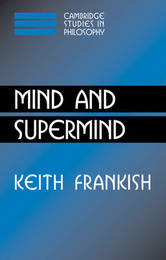
|
Mind and Supermind
Paperback / softback
Main Details
| Title |
Mind and Supermind
|
| Authors and Contributors |
By (author) Keith Frankish
|
| Series | Cambridge Studies in Philosophy |
|---|
| Physical Properties |
| Format:Paperback / softback | | Pages:272 | | Dimensions(mm): Height 215,Width 140 |
|
| Category/Genre | Philosophy of the mind |
|---|
| ISBN/Barcode |
9780521038119
|
| Classifications | Dewey:128.2 |
|---|
| Audience | | Professional & Vocational | |
|---|
| Illustrations |
2 Tables, unspecified; 2 Line drawings, unspecified
|
|
Publishing Details |
| Publisher |
Cambridge University Press
|
| Imprint |
Cambridge University Press
|
| Publication Date |
26 July 2007 |
| Publication Country |
United Kingdom
|
Description
Mind and Supermind offers an alternative perspective on the nature of belief and the structure of the human mind. Keith Frankish argues that the folk-psychological term 'belief' refers to two distinct types of mental state, which have different properties and support different kinds of mental explanation. Building on this claim, he develops a picture of the human mind as a two-level structure, consisting of a basic mind and a supermind, and shows how the resulting account sheds light on a number of puzzling phenomena and helps to vindicate folk psychology. Topics discussed include the function of conscious thought, the cognitive role of natural language, the relation between partial and flat-out belief, the possibility of active belief formation, and the nature of akrasia, self-deception and first-person authority. This book will be valuable for philosophers, psychologists and cognitive scientists.
Author Biography
Keith Frankish is Lecturer in Philosophy at the Department of Philosophy, The Open University. He has published in Analysis and Philosophical Psychology and contributed to Language and Thought: Interdisciplinary Themes eds. Carruthers and Boucher (Cambridge, 1998).
Reviews'This is an important contribution to our understanding of mind and of the nature of belief. Frankish explores, with care and imagination, the subtle ways in which science and our 'folk' image converge and diverge. Folk psychology, according to Frankish, has two distinct theoretical cores. Failure to make this distinction leads to confusion and cross talk. In this well-paced and readable treatment, Frankish offers a clear, constructive and original angle on some of the most persistent and perplexing problems in the field. Recommended reading for anyone interested in the philosophy and science of mind and belief.' Andy Clark, Professor of Philosophy and Director of the Cognitive Science program, Indiana University
|